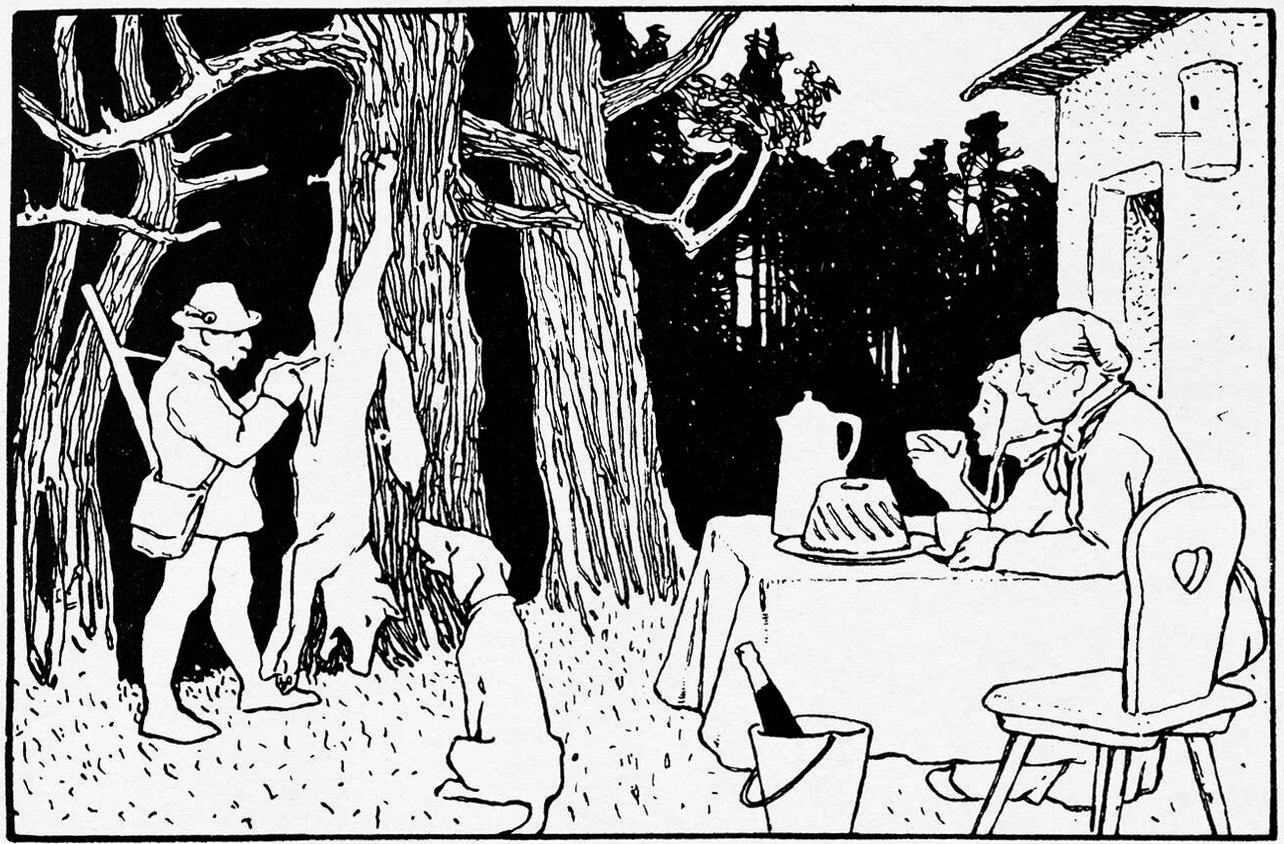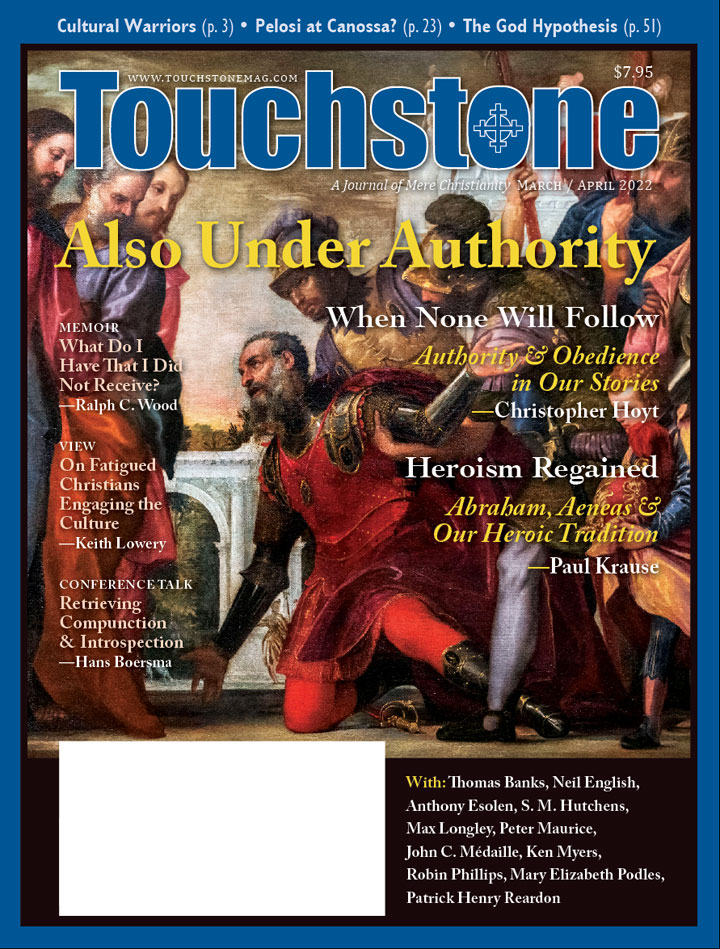Say Something
Let us not grow weary in doing good. . . . (Gal. 6:9)
Russell Kirk, man of letters and father of conservative thought in America, once said that it is impossible even to go out to dinner without being bombarded by the vulgarities of the culture. He mostly had in mind the growing propensity of restaurateurs to blare obnoxious music over loudspeakers, making meaningful conversation at dinner all but impossible.
But I remembered Dr. Kirk's observation during an outing to the movies some years ago with my wife. We sat in the top row of a rather small theater. And just prior to the start of the movie, three teenagers walked in, moving past us in the row to take up seats at the far end to our right. There were about five or six seats separating us from these kids. The group consisted of two girls and a boy, with one of the girls and the boy being an obvious "couple."
About half-way through the movie, I noticed some commotion among the group to my right, and when I looked down the row I was surprised to see one of the girls, having removed most of her clothes, sitting on the boy's lap facing him. These two teenagers were, it seemed, entirely uninterested in the movie's treatment of the tension between our personal commitments and our loyalty to the state.
Now, I'm no prude. Neither am I blind to the proclivities of teenagers, but this business of taking off your clothes in a public setting was a new one on me. These kids were perhaps 14 or 15 years old. I don't think the boy was even growing whiskers yet. (I got an up-close and personal look at his face a little further into our story.)
So I sat there in my seat for a moment trying to decide what, if anything, I should do about the activities at the end of the row. At first, I was just really irked. They were, after all, a distraction from what was taking place on the screen. But the longer I thought about it, the more I found another reaction beginning to emerge: fatigue. The cultural decay all around us feels increasingly like a relentless assault, and sometimes I grow tired of the conflict and want simply to withdraw from the
engagement.
Fatigue & Its Temptations
There was a popular, angst-ridden song current about the time we went to that movie. The song was "Say Something" and it was performed by Christina Aguilera. In the song, she speaks at length about being on the verge of throwing in the towel on some relationship she had hoped would lead to greater things.
Now, when one merely reads the lyrics of the song, they come across as a tad incoherent and more than a little redundant. But when sung, the listener can feel more of the emotional weight of her painful disappointment. She laments that the other person in the relationship is unresponsive and has checked out. In my mind, I picture Ms. Aguilera emoting these words while some young man sits on the couch, obliviously immersed in a video game, or watching ESPN. (As it happens, some poor woman has written an entire book about this very phenomenon: Game Widow by Wendy Kays.)
I confess that I feel fatigued sometimes when I hear one of the frequent calls for Christians to "engage the culture." It is one thing to challenge believers to be a prophetic witness to the impact Jesus has had on their lives. It is quite another thing to flirt with an emotionally needy craving for cultural acceptance. When I consider the recurring drumbeat that I hear from some Christian circles about cultural relevance, I sometimes catch a whiff of that craving. Not always, but neither do I think that the emotional neediness is invariably absent.
If the call to cultural engagement or relevance is accompanied by any expectation that the culture is going to love us back, I'm afraid we may ultimately find ourselves in poor Ms. Aguilera's shoes.
I have learned over time that the extent to which I experience fatigue while engaging the culture is directly related to the expectations I carry regarding my own responsibility for any particular outcome. If I believe that the way to measure success lies in how the culture responds, then not only will I be disappointed, but I will be like Ms. Aguilera, sorely tempted to throw in the towel.
Isaiah's Role—And Ours?
I was recently reading the sixth chapter of the book of Isaiah, where the prophet receives his commission. It is a well-known passage, in which Isaiah receives a vision of the scene around God's throne. His reaction is pretty typical of other reactions that people have had upon seeing God "in person." Throughout Scripture, such reactions usually fall somewhere between abject terror and involuntary unconsciousness. I just observe that—notwithstanding the lyrics of many contemporary Christian songs—the notion that people do a happy dance of some kind when first encountering God face-to-face is essentially unsupported by the historical record.
But I digress.
In Isaiah's vision, God asks for a volunteer to engage the culture of that time. And Isaiah, being one of the main characters in the story, predictably steps forward and volunteers for the task. So far so good. But this is the point at which things take a rather surprising turn. God instructs Isaiah to proceed with a prophetic witness, the purpose of which is to further entrench the culture in unbelief and hard-heartedness. In other words, God's mission for Isaiah is to increase the culture's opposition to God by his faithful prophecy.
I feel quite sure this is not what anyone means these days by "engaging the culture." In fact, I am confident that few people even consider the possibility of measuring the success of Christian ministry by the extent to which it provokes a cultural backlash against God.
Of course, one of the differences between our engagement with contemporary culture and Isaiah's specific commission is that God made explicit, for Isaiah, what he expected regarding the impact of Isaiah's message. But even though God hasn't specifically told us how to measure our own results (although Jesus did warn, "Don't be surprised if the world hates you"), I have learned that cultural engagement is less fatiguing when I don't harbor hidden expectations regarding specific outcomes.
What if, in the twenty-first century, the Church is destined to play Isaiah's role, and with similar results? That's a question I wonder about. A lot.
To Keep Something Alive
Irrespective of the response of the culture, it is still the case that a resolute determination to provide a faithful witness is an act of love directed toward those who come after us. Poets, I find, often understand these things before the rest of us do. Or at least before I myself do. It was T. S. Eliot, after all, who said: "We fight for lost causes because we know that our defeat and dismay may be the preface to our successors' victory. . . . We fight rather to keep something alive than in the expectation that anything will triumph."
In his memoir, Fear No Evil, Natan Sharansky tells of his imprisonment and unspeakable torture at the hands of the Soviet KGB. Their mode of operation was to torture prisoners in order to extract "confessions" to entirely fictitious crimes against the state. In one dramatic moment, Sharansky relates, he was at the breaking point, on the verge of confessing to the KGB's made-up charges against him, just to make the torture stop.
But in that excruciating moment, he was able to recall how the strength and courage of those who came before him had enabled him to keep his commitment to the truth up until that point. And he was able to recognize that if he broke down and confessed to a lie, it might in some small way undermine the determination of those who came after him. It was his memory of the courage and faithfulness of his predecessors that, in that moment, gave him the strength and courage to endure horrific torture and subsequent years-long separation from his wife.
So it may be that there is much more at stake in our own cultural engagement than just the response of our contemporary culture. Perhaps growing weary in doing good actually betrays a lack of love for those who come after us. A lack of gritty determination on our part now may very well have the effect of undermining the commitment and determination of those who come into the world long after we're gone.
Barging In
It wasn't that I considered all this that night at the movies, as I sat there feeling tired at the thought of dealing with the children at the end of the movie theater row. But I had pondered these thoughts enough previously that I recognized my own CEFS ("cultural engagement fatigue syndrome") when I saw it.
So, for the sake of those children, for the sake of the other movie theater patrons, and for the sake of sheer decency, I decided to interrupt their little soiree and introduce myself. I suspected that I would embarrass them by my actions, but avoiding the embarrassment of misbehaving children has never been a particularly weighty aspect of my overall decision-making paradigm. My own children can act as witnesses to my veracity in this
matter.
Anyway, I barged in on the young movie patrons' amour, catching them in flagrante delicto as they say. The young girl, experiencing a sudden collapse of interest in the boy, leaped to the far seat while attempting to cover up. The boy, eyes the size of silver dollars, sat staring up at me. I leaned down and positioned my nose a few inches from his face and said, "I want the two of you to cut it out. Right now." The young man, clean cut, whiskerless and wearing a terrified expression, simply nodded and said, "Yes, sir." I informed them I was going to speak with security and then I would be back.
By the time I returned, the group in the corner was the very picture of quiet propriety. Anyone would have thought they were watching the most fascinating movie of all time. My wife informs me that, while I was absent from the theater, there was a mad scramble among the kids to make themselves more appropriately attired.
I sat there for the rest of the movie thinking of some things I wanted to say to those teens after the show. It was not my intention to deliver a lecture, but to offer a heartfelt warning and a sincere invitation to consider an alternative approach to their lives. Alas, it may not surprise the reader to learn, while I may have wanted to speak to the kids, they were decidedly uninterested in speaking with me. In fact, ten minutes before the movie was over, they stood up and quietly filed out of the
theater.
Give Us More Woodcutters
There is a long-running debate, even within certain Christian quarters, over whether contemporary culture is really and truly more degraded than in times past, or if it is all just a matter of perception. One would hope that when children are having sex in the public square, the observation that things in the culture are badly awry would be entirely uncontroversial. But probably not.
I often wonder what life will be like for my grandchildren, and their very presence in the world offers a potent reminder to me of the dire consequences of apathy and fatigue on the part of those of us who have come before them. So I persevere.
I opened this reflection with a little bit of Russell Kirk, and perhaps I should close with his words as well. Those of us fortunate enough to have children to love in our lives, could do much worse than taking these words to heart:
In a violent time, it is prudent to rear children on tales of peril—and of heroism. If enough of the rising generation take the heroes of fantasy for their exemplars, the wolf will find sustenance less readily. "What sharp teeth you have!" "The better to eat you with, my dear." Give us more woodcutters, in the nick of time.
Let us not grow weary.
Keith Lowery works as a senior fellow at a major semiconductor manufacturer, where he does advanced software research. He worked in technology startups for over 20 years and for a while was a principal engineer at amazon.com. He currently serves as an elder at Lake Ridge Bible Church in a suburb of Dallas, Texas.
subscription options
Order
Print/Online Subscription

Get six issues (one year) of Touchstone PLUS full online access including pdf downloads for only $39.95. That's only $3.34 per month!
Order
Online Only
Subscription

Get a one-year full-access subscription to the Touchstone online archives for only $19.95. That's only $1.66 per month!
bulk subscriptions
Order Touchstone subscriptions in bulk and save $10 per sub! Each subscription includes 6 issues of Touchstone plus full online access to touchstonemag.com—including archives, videos, and pdf downloads of recent issues for only $29.95 each! Great for churches or study groups.
Transactions will be processed on a secure server.
more on culture from the online archives

33.1—January/February 2020
Do You Know Your Child’s Doctor?
The Politicization of Pediatrics in America by Alexander F. C. Webster
more from the online archives
calling all readers
Please Donate
"There are magazines worth reading but few worth saving . . . Touchstone is just such a magazine."
—Alice von Hildebrand
"Here we do not concede one square millimeter of territory to falsehood, folly, contemporary sentimentality, or fashion. We speak the truth, and let God be our judge. . . . Touchstone is the one committedly Christian conservative journal."
—Anthony Esolen, Touchstone senior editor












